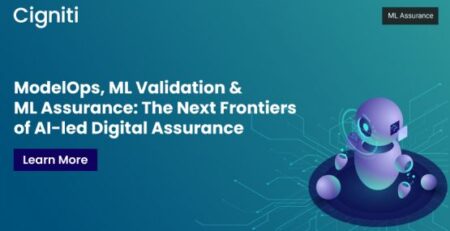DevOps will stagnate the ongoing evolution of Software Testing? Seriously?
The rapid acceptance and evolution of DevOps as a practice has raised numerous questions and doubts. The subject under consideration puts multiple aspects into perspective that deserve a well-fed discussion and focussed consideration. DevOps has substantially changed the software development and testing scenario both for testers as well as developers. Role of DevOps within Quality Assurance has been potentially discussed and questioned as well. The question is, will DevOps define the new phase in Software Testing or will it stagnate further growth for Quality Assurance and Testing?
Liat Palace, a JAX London speaker has mentioned in ‘The DevOps cookbook’, ‘One of the major challenges facing every significant change or transformation is how to start. This is especially true in the case of DevOps implementation. There are many definitions of DevOps. From my experience, for example, if you ask for a definition from ten different people you will get ten different answers. Moreover, every implementation is considerably different from all others, and so is the focus and need of the relevant organization.’
Breaking the ‘Testing Course’ with DevOps
According to a recent news update, ‘Car manufacturer Audi was forced to delay the release of its first electric SUV four weeks later than planned due to a software development issue.’ The article further states, ‘The rise of the Internet of Things (IoT) and more technology being embedded into cars, software is now a critical part of the auto business as well. Especially, considering the many cybersecurity concerns that car software can present, automakers like Audi must ensure that they are taking all necessary steps in the software development process, including building in security measures from the start.’
Incidents and software glitches such as these, emphasize the growing significance of Quality Assurance and Software Testing. They further highlight the fact that QA needs to follow a protocol to ensure that the software or application at hand doesn’t slip away under unforeseen circumstances and meets the necessary regulatory requirements. Traditionally, QA and Testing would take a particular course, where it would test the build once it is shared with them by the development teams.
DevOps enables teams to break this course and get right at the beginning of the Testing activity. The practices and protocols defined by DevOps are enabling development and testing teams to deliver applications and software with minimal glitches and practically, the capability to deal with unforeseen situations in real time. This kind of protocol is needed when manufacturers and businesses have to embed new and emerging technologies.
How Quality Assurance fits within the DevOps Build?
If DevOps is the chosen methodology, it is important for every development and testing element to fit into the DevOps cycle. Practically, all the efforts towards testing must align itself with DevOps practices and conduct. The underlying idea and objective is to not only bring speed, but also ensure agility in the testing process. Additionally, DevOps involves Continuous Testing, Continuous Development, and Continuous Integration. This is impossible to achieve without automation of tests. QA has to ensure that along with speed even the quality is kept intact.
Hence, QA implements specialized automation testing tools and continuous integration tools to achieve the continuous integration objectives defined by DevOps. Teams are able to confirm that the test cases are automated and the code coverage is almost 100%. At the same time, the environment has to be standardized and deployment on the QA boxes is automated. Even the pre/pro-testing tasks are being automated and synced in with the Continuous Integration cycle.
All these activities need rigorous coordination efforts across various functions within the development and delivery cycle. This brings in more coordination and collaboration amongst team members and all the functions. The process motivates everyone to work together and take responsibility for their actions. For instance, the deployment engineers can add test cases to the QA repository and QA engineers can build automation test cases within the DevOps course of action.
Is DevOps a defining moment for QA?
Whether or not a crucial landmark for QA, DevOps is needed for ensuring continuous improvement and continuous integration. It takes the QA process to the next level that encourages collective contribution and collaboration. The testing process could involve numerous tasks such as UAT, Compatibility Testing, or Performance Testing. DevOps makes it more inclusive and faster. In terms of automation, QA draws line as to where and how much automation is needed for the activity.
As reported by an online portal, at Gartner’s Symposium Conference, Gartner’s VP Andy Rowsell-Jones mentioned, ‘Digital initiatives and growth are the two top business priorities for CIOs in 2019’. The Gartner survey further states, ‘Of top performers, 75 percent have implemented product-centric delivery, creating longer-lived, “ideate-build-run teams” that work on a persistent business issue, rather than focusing on a single point-in-time initiative. This has clear benefits, and drives a closer engagement between IT and the business, faster delivery of new features, and results in a more consumer-centric orientation. In general, the procurement process hates this transition, he cautioned and said this shift requires more of a focus on “DevOps” and a real culture change.’
The business environment will continue to work towards achieving Speed and Quality in the same breath. Hence, DevOps and QA needs to work together and make this possible for enterprises with their diverse interests and cultural backgrounds.
At Cigniti, we standardize efforts and ensure accelerated time to market with DevOps Testing. We also focus on delivering improved deployment quality and greater operational efficiency. Cigniti’s CI testing experts boast of a rich experience in Continuous Integration testing and can configure and execute popular CI tools such as Agile GO, Cruise Control, Chef, Puppet, Microsoft TFS, Jenkins, Bamboo, Hudson and so on, helping client’s DevOps teams.





Leave a Reply